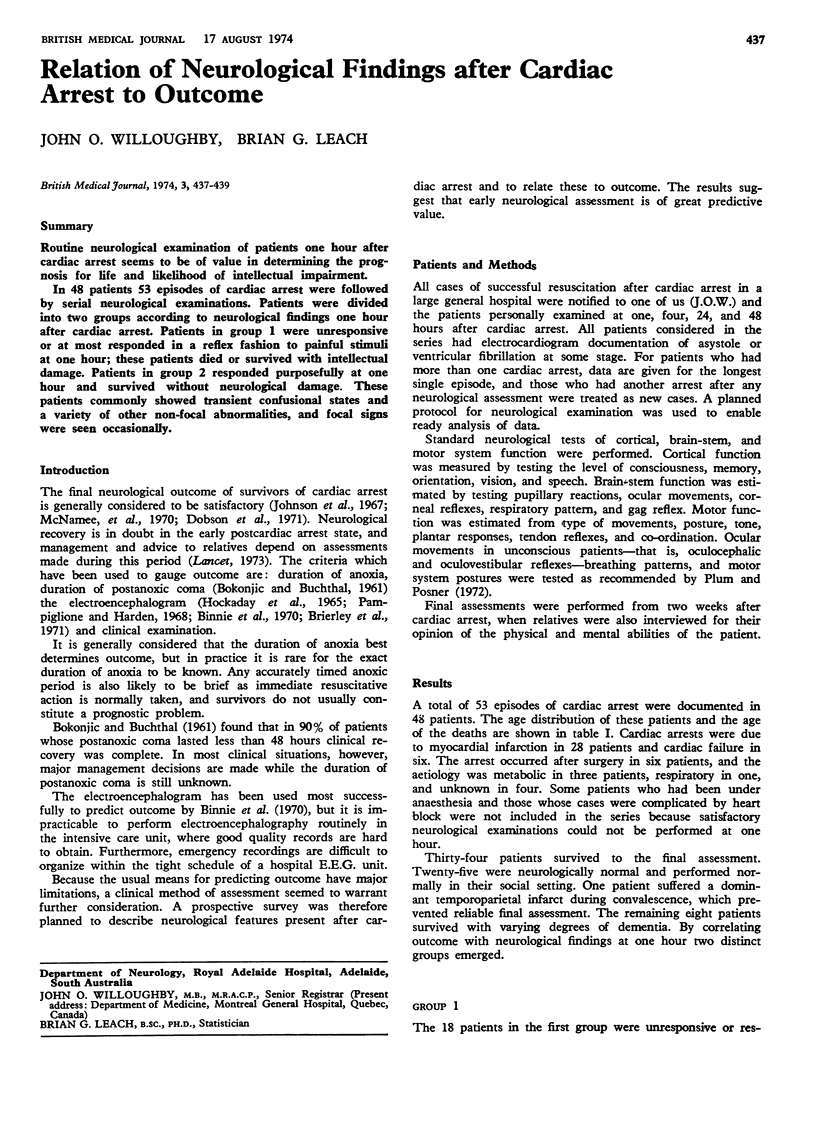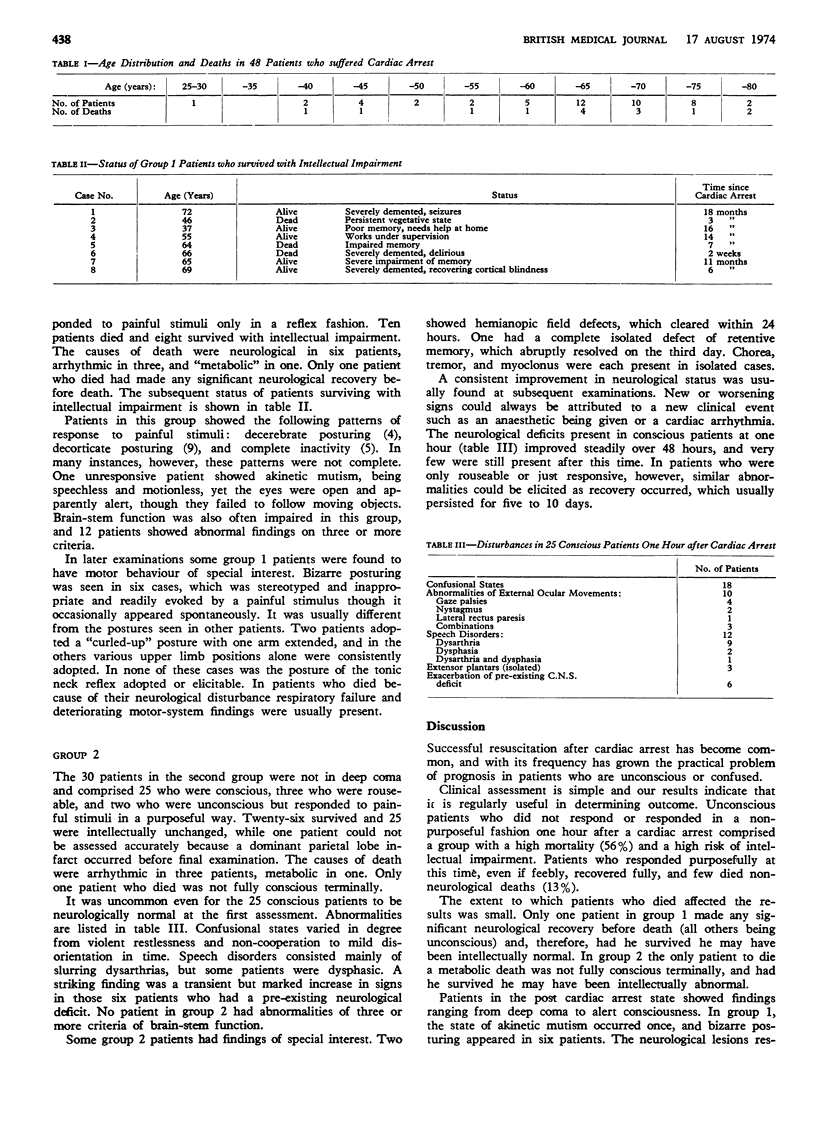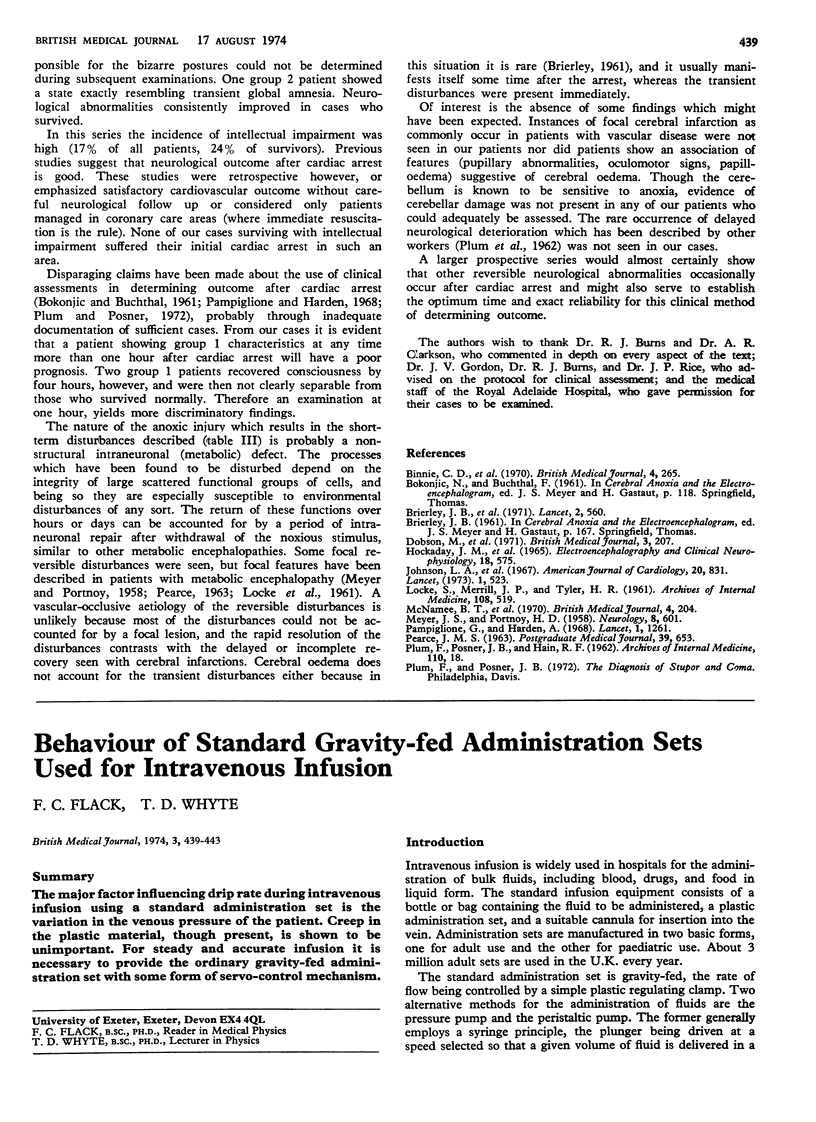Abstract
Routine neurological examination of patients one hour after cardiac arrest seems to be of value in determining the prognosis for life and likelihood of intellectual impairment.
In 48 patients 53 episodes of cardiac arrest were followed by serial neurological examinations. Patients were divided into two groups according to neurological findings one hour after cardiac arrest. Patients in group 1 were unresponsive or at most responded in a reflex fashion to painful stimuli at one hour; these patients died or survived with intellectual damage. Patients in group 2 responded purposefully at one hour and survived without neurological damage. These patients commonly showed transient confusional states and a variety of other non-focal abnormalities, and focal signs were seen occasionally.
Full text
PDF


Selected References
These references are in PubMed. This may not be the complete list of references from this article.
- Binnie C. D., Prior P. F., Lloyd D. S., Scott D. F., Margerison J. H. Electroencephalographic prediction of fatal anoxic brain damage after resuscitation from cardiac arrest. Br Med J. 1970 Oct 31;4(5730):265–268. doi: 10.1136/bmj.4.5730.265. [DOI] [PMC free article] [PubMed] [Google Scholar]
- Brierley J. B., Graham D. I., Adams J. H., Simpsom J. A. Neocortical death after cardiac arrest. A clinical, neurophysiological, and neuropathological report of two cases. Lancet. 1971 Sep 11;2(7724):560–565. doi: 10.1016/s0140-6736(71)92148-9. [DOI] [PubMed] [Google Scholar]
- HOCKADAY J. M., POTTS F., EPSTEIN E., BONAZZI A., SCHWAB R. S. ELECTROENCEPHALOGRAPHIC CHANGES IN ACUTE CEREBRAL ANOXIA FROM CARDIAC OR RESPIRATORY ARREST. Electroencephalogr Clin Neurophysiol. 1965 May;18:575–586. doi: 10.1016/0013-4694(65)90075-1. [DOI] [PubMed] [Google Scholar]
- Johnson A. L., Tanser P. H., Ulan R. A., Wood T. E. Results of cardiac resuscitation in 552 patients. Am J Cardiol. 1967 Dec;20(6):831–835. doi: 10.1016/0002-9149(67)90397-9. [DOI] [PubMed] [Google Scholar]
- LOCKE S., MERRILL J. P., TYLER H. R. Neurologic complications of acute uremia. Arch Intern Med. 1961 Oct;108:519–530. doi: 10.1001/archinte.1961.03620100011003. [DOI] [PubMed] [Google Scholar]
- MEYER J. S., PORTNOY H. D. Localized cerebral hypoglycemia simulating stroke; a clinical and experimental study. Neurology. 1958 Aug;8(8):601–614. doi: 10.1212/wnl.8.8.601. [DOI] [PubMed] [Google Scholar]
- McNamee B. T., Robinson T. J., Adgey A. A., Scott M. E., Geddes J. S., Pantridge J. F. Long-term prognosis following ventricular fibrillation in acute ischaemic heart disease. Br Med J. 1970 Oct 24;4(5729):204–206. doi: 10.1136/bmj.4.5729.204. [DOI] [PMC free article] [PubMed] [Google Scholar]
- PLUM F., POSNER J. B., HAIN R. F. Delayed neurological deterioration after anoxia. Arch Intern Med. 1962 Jul;110:18–25. doi: 10.1001/archinte.1962.03620190020003. [DOI] [PubMed] [Google Scholar]
- Pampiglione G., Harden A. Resuscitation after cardiocirculatory arrest. Prognostic evaluation of early electroencephalographic findings. Lancet. 1968 Jun 15;1(7555):1261–1265. doi: 10.1016/s0140-6736(68)92287-3. [DOI] [PubMed] [Google Scholar]


